- Home
- Allan Topol
The Italian Divide Page 11
The Italian Divide Read online
Page 11
“Two more weeks, Roberto,” he said calmly.
Parelli raised his hand and pointed a bony finger at Alberto. “You’ll be sorry you did this. Mark my words. You’ll pay dearly for this decision.”
Parelli’s words frightened Alberto, but he held his ground. “I’m sorry you feel like that.”
Parelli stormed out of the office.
Rome
Craig stopped for flowers on the way to Giuseppe’s house. Carolyn had once told him, “Women always like roses.”
When Giuseppe opened the door of the first floor apartment in Rome, close to the Piazza Navona, his head snapped back in surprise. He waited to close the door before he said, “You sure don’t look like the Craig Page I remember. My eyes must be getting weaker with age.”
“I had a little work. A nip and tuck.”
“You had a lot more than that.”
“Well, I enjoy life, and unless I did something drastic, I figured Zhou Yun would deprive me of that.”
“A very wise conclusion.”
Looking at Giuseppe, Craig thought he’d aged ten years in the twenty-one months since he had last seen him. His hair, formerly a sandy brown, was now mostly gray. He had wrinkles on his face and a sad expression. He’d added about twenty pounds, which at 5′ 10″ made him look chunky.
Craig held out the roses. “These are for Antonia. I’m sure you never bring your wife flowers.”
Giuseppe sighed deeply. “Antonia passed six months ago. She had a tough time with ovarian cancer.”
“Oh. I’m so sorry. I had no idea.”
Craig put the flowers down and hugged him.
“I felt bad that I couldn’t tell you, but I had no way of locating you. I even tried Betty, but she was no help.”
“I know. It was as if I dropped off the face of the earth. So how are you doing now?”
“A little better. I still think about her every day. But work helps. I lose myself in that. You must know how I feel.”
“After Carolyn died, it was awful. Eventually, I got over it. Then I had a repeat with Francesca’s murder.”
“I was there when you got the news about Francesca. I’ll never forget that day here in Rome. After we captured those suicide bombers.”
“Seems like so long ago.”
“Now, I have more bad news for you.”
Craig was alarmed. “Yeah, what?”
“Instead of getting a fabulous meal from Antonia, you get my cooking.”
“Should I take something to coat my stomach?”
“Not necessary. I keep it simple. We’ll have some sliced tomatoes first. Then a grilled Florentine steak with roast potatoes. And I found a couple of bottles of ’97 Giuseppe Quintarelli Valpolicello in the cellar that I’d forgotten I had.”
“The Quintarelli. Italy’s greatest winemaker. I was so sorry to learn the old man died. That sounds like a feast.”
“Before we get to that, how about a drink on the patio in the back and we’ll catch up.”
“Fine.”
“I’ll get a bottle of white wine and some nuts.”
“Nuts?”
“Yeah. I read somewhere that you Americans like nuts with your cocktails.”
“Only on airlines.”
They both laughed.
It was a crystal-clear night with a comfortable temperature and surprisingly low humidity. Seated with a glass of arneis, Giuseppe was staring at Craig. “You know whom you look like?”
“Let me guess. Enrico Marino, the race car driver.”
“Have other people told you that?”
“I am Enrico Marino.”
“You’re kidding.”
“Nope. In the flesh.”
“You won the Stresa race?” Giuseppe sounded incredulous.
“Somebody had to.”
“Okay. Now bring me up to date on everything you’ve been doing since you called to tell me that you’d been so ungraciously fired as CIA Director.”
For the next half hour, Craig talked, interrupted by questions from time to time, about his plastic surgery in Switzerland, his racing, and his mission in Argentina.”
“What about Elizabeth?” Giuseppe asked. “You left her out of the story.”
“I don’t want to talk about her.” Craig sounded angry.
“Do it anyhow. For me.”
Craig knew that when Giuseppe was insistent about something, he refused to be put off. And Giuseppe liked Elizabeth.
“Well, we had an argument the night I was fired. She was putting her career ahead of all else.”
“How inconsiderate after you’d always relegated your career to second place in your relationship with her.”
“Thank you for telling me what a shit I was.”
“That’s what good friends are for. Besides, somebody had to.”
“Well, after that, I decided it would be safer for her if she didn’t see me. Zhou Yun was likely to focus on her. We didn’t have any contact until last Sunday in Stresa. She showed up after the race and we had dinner. That didn’t go well. End of story.”
“Sorry to hear that. I always thought you two were good together.”
“Life moves on.”
As soon as the words were out of Craig’s mouth, he thought about Antonia and was sorry he had said them.
“So it does,” Giuseppe replied glumly.
“Now, let me tell you why I came.”
“Okay, but first I have to do something about a steak. And while I do, you can make yourself useful.”
Craig sliced tomatoes and sautéed the potatoes. Giuseppe was watching the meat on the grill and decanting the wine.
When they finally sat down at the table, Craig took a bite of steak and said, “Hey this is great.”
“Only the best for you. Now tell me why you’re here.”
Before responding, Craig sipped some of the Quintarelli. It was an incredibly elegant wine. “The guy was a genius. Thanks for sharing it with me.”
“Okay. Now talk.”
Craig told Giuseppe everything he knew about Federico’s death.
At one point, Giuseppe said, “I know Alberto Goldoni. Six months ago, some suspected Iranian terrorists were using his bank to launder money without his knowledge. He was very cooperative and helped us nail them.”
When Craig finished, Giuseppe asked, “What do you want me to do?”
“Investigate Federico’s death. I’ll work with you.”
Giuseppe shook his head. “It’s great to see you and resume our friendship. However, you of all people know I can’t do that. You held my job for God’s sake.”
“I think you can.”
“C’mon Craig. I know Federico was your friend and sponsor. But it was a jewelry robbery that went wrong, I have to leave it to the French police.”
“You know it’s more than that. There’s an international component. Russians. French. Italians.”
“I notice you didn’t mention terrorists. I’m the Director of Counterterrorism.”
“Your job description isn’t that narrow. I wrote it.”
Giuseppe shook his head. “Sorry, Craig, I can’t do it.” He sounded vehement.
Craig was surprised at Giuseppe’s reluctance to become involved. “What’s bothering you?”
“Twice in the last year I received a reprimand for trying to intervene in purely domestic incidents. One in France. One in Germany. I like my job. It’s all I have now.”
“Look at the facts.”
“That’s the point. You don’t have any facts. All you told me is what Amelie told you.”
“Fair enough. Alright, I have an idea. Tomorrow morning order the file electronically from the Biarritz police. We’ll look at it and see if any facts in the file persuade you to become involved.”
When Giuseppe didn’t respond immediately, Craig decided he had a chance.
“Damn, you’re stubborn,” Giuseppe finally said.
“Coming from you that’s the supreme compliment. Nobody is more experienced in
solving international crimes than you are. In your gut you …”
“Now you’re resorting to flattery to get your way.”
Giuseppe pulled a white handkerchief from his pocket. “I surrender. Tell you what. Tomorrow morning I have a meeting outside the office. Before I leave, I’ll get the file from Biarritz and set you up in an office with it. When I get back, we’ll see if you have enough to convince me.”
* * *
The next morning, Giuseppe downloaded and handed Craig the file from Biarritz. While Giuseppe went off to his meeting, Craig dug into it. By the time Giuseppe returned two hours later, Craig told him, “I have the facts you need.”
“Okay. Go ahead.”
“Amelie told me they returned to the house at ten minutes to twelve Saturday evening. Alberto, whom you know and respect, told the police that the dinner ended at around 11:30, which confirms her account.”
“I have that. Go on,” Giuseppe said impatiently.
“The police report shows that the house security system was disarmed at 9:53 p.m. on Saturday. That must be when the killers entered the house.”
Giuseppe was listening carefully. “Agreed.”
“The report also says that the house had a sophisticated vault in a bedroom closet, which was where jewels were kept, according to Amelie. The timer on the vault showed its last opening at 10:27, more than an hour before Amelie and Federico came home. The vault was left open. The police report doesn’t list the jewels that were stolen. None of the jewelry Amelie was wearing was taken.”
Craig paused for a moment.
Giuseppe finished his thought. “Meaning that the Russians came to execute Federico. Otherwise, they would have taken the jewels in the vault and escaped before Federico came home. And taken the jewelry she was wearing.”
“Exactly.”
Giuseppe rubbed his hand over his chin. The creases deepened on his forehead. Without saying a word, he closed his eyes. In silence, Craig let him digest what he’d heard.
Finally, he opened them and said, “Okay. I’m convinced. I’ll work on this case.”
“Good. Now, I think you and I should go to Federico’s office in Milan. Interview people and check records. We should see whether the takeover by the Singapore bank had anything to do with his murder.”
“We?”
“That means you and I.”
“I got that much. What I’m puzzling over is how I explain your presence.”
Craig thought about it for a moment and responded. “I’m a good friend of Federico and Amelie who’s helping with background information.”
Giuseppe smiled. “You must have passed the CIA course in deception with flying colors.”
“I’m usually too modest to admit it, but I was top of the class at the Farm… . Let’s go this afternoon.”
“Whoa boy. It’ll have to be tomorrow morning. I have to finish up some loose ends here. But since you want to get moving this afternoon, I have a job for you.”
“What’s that?”
“Get in touch with your friend, Amelie. Ask her to give you a list of the jewels that were stolen from the vault. Insurance policies always identify them in detail. If she has the policy with her in France, have her read them to you. If not, have her tell you where the policy is in her house in Milan.”
“What do you intend to do with the list of stolen jewels?”
“We might be able to find the killers by following the jewelry trail. My experience is that robbers try to unload expensive jewelry as soon as possible. I have a friend, Jean-Claude, in the French National Police who has developed a relationship with the main outfits in France that fence high-end jewelry. There are only a couple of them. We’ll give him the list. If any of those have shown up, the fence may be able to provide a description of whoever gave it to him.”
“I like that. It could work.”
“Occasionally I have a good idea. At any rate, you should stay in Milan overnight. I’ll meet you there in the morning. First, I’ll forward your list of stolen items to Jean-Claude. Then we’ll go to Federico’s bank.”
* * *
From Linate Airport in Milan, Craig called Amelie. When she answered, “Allo,” Craig detected panic in her voice. She calmed down when he told her it was Enrico Marino.
She understood exactly what he wanted and why.
“The insurance policy is buried in a stack of papers in the center drawer of Federico’s desk in the study. The one with the green leather top.”
“Is the drawer locked?”
“Key’s in a ruby topped snuff box on the second shelf of the bookcase.”
“Good. Thanks.”
“But how will you get into the house?”
“Don’t worry. I’ll find a way.”
“Are you sure?”
“Absolutely.”
She seemed satisfied.
Craig had been trained well in his CIA days at the Farm. Breaking and entering was a basic course. He had finished top of the class in that one as well.
From the airport, Craig drove straight to her house, making certain he wasn’t being followed.
Once he was inside, he tread softly, checking each room to make sure it was deserted and not booby trapped. Nothing here. The Russians must have moved on.
He found the policy and left quickly. It would be safer, he decided, not to stay in his own house tonight after the threat from the Russians. So he checked into the hotel Palazzo Parigi on Corso di Porta Nuova in the heart of Milan’s fashion district.
From his room, he called Amelie and read off the items that were insured. Without hesitating, she told him which ones had been stolen.
They included a ring with a 12.4 carat cabochon emerald in the center surrounded by 14 diamonds, valued at 950,000 euros; a bracelet with alternating faceted sapphires (totaling 7.0 carats) and diamonds (totaling 8.3 carats), valued at 1.2 million euros; and a yellow gold necklace with clusters of diamonds and rubies, valued at 1.35 million euros.
Several other less important pieces had been stolen as well.
My God, Craig thought, the woman had valuable stuff. He quickly added it up. Almost five million euros worth of jewelry had been stolen. Most were very distinctive pieces.
Craig concluded that the Russians weren’t following him. So he went downstairs and had dinner in the hotel’s luxurious gastronomic restaurant that had excellent food and was a favorite of many of Milan’s top social set. Several people recognized Enrico Marino and congratulated him on his Stresa victory. One couple asked Craig to join them for dinner, but he declined telling them he was tired and wanted to eat quickly and leave. “I’m afraid I won’t be much fun.”
Over dinner, he thought some more about the jewelry. He wondered whether Federico had given them to Bonita, his first wife. Well, regardless, no mere robber would ever hang around a house once he had these in his hands. The Russians clearly had another agenda. Someone had wanted Federico dead. Craig was determined to find out who it was.
Paris
The day after Elizabeth’s article on Parelli’s Venice speech was published, she received a call from Jonathan Hanson, an American expat who had held her job as foreign editor of the International Herald. He had retired twelve years ago and was living in Provence. When she was elevated to foreign editor, Hanson came to Paris and took her to lunch. He had offered his help if she ever wanted guidance, but she had not taken him up on it and hadn’t seen Hanson since then.
Today, he sounded excited when he said, “Elizabeth, it’s Robert Hanson.”
“Good to hear from you.” She almost said Bob, but remembered he hated that so she quickly mumbled “Robert.”
“Good piece you did on Roberto Parelli. First rate journalism.”
Elizabeth was thrilled with the compliment. Hanson had won prizes for articles dealing with political developments in Europe. “You made my day.”
“Now, I want to be helpful. I have some background info for you on Roberto Parelli. How about having lunch with me tomorrow?
I’ll come to Paris.”
Elizabeth was delighted. She wanted to understand more about the candidate. Hanson would never have called if he didn’t have something significant. “Sure. Tell me where and when.”
* * *
For lunch the next day, Hanson selected a bistro not far from the Herald’s office. When she arrived, she found him seated at a table in a corner. The place was quiet. They’d be able to talk.
Hanson was sipping red wine as she approached. The tall and trim Hanson stood up. He looked to be a model of health and vigor. He was sun tanned and had thick brown hair and a smile that turned up his mouth. He could have been an ad for the good life in Provence. She noticed a bottle of St. Joseph on the table. The waiter poured her a glass.
“Even though we’re both Americans,” Hanson said, “we can still drink at lunch.”
“Sure. Why not?”
A portly waiter with a bushy brown mustache came to the table. Elizabeth ordered moules and frites; Hanson asked for steak and frites.
Hanson raised his glass. “Here’s to your superb article on Parelli. And I loved the title: ‘Roberto Parelli—Savior or Sinner.’”
His words made her feel good. “Coming from you, that compliment means a great deal. So which is he: saint or sinner?”
“Clearly a sinner. When you hear what I have to say, you’ll agree with me.”
“How do you know Parelli?”
“We go back a long way. Would you believe to Yale when I was an undergrad.”
“The Dark Ages.”
Hanson laughed. “Tell me about it.”
“I wasn’t even born then.”
“Ouch. That hurt.”
Hanson paused to sip some wine and said, “First, let’s talk about Roberto Parelli’s father, Mario. That becomes relevant later on. When Mussolini came to power, Mario wasn’t in politics. He was operating the Parelli vineyards and winery. As I’m sure you know, Mussolini never agreed to Hitler’s demands that he round up the Jews and deport them to camps like Auschwitz. Once Mussolini was deposed the first time, near the end of the war, Germany invaded Italy and the SS began rounding up and deporting Jews. Mario was outraged. Not only were some of his friends Jewish, but he was a decent and honorable person. He made his farm and vineyard a stopping point for Jews escaping from Turin into Switzerland.

 Conspiracy
Conspiracy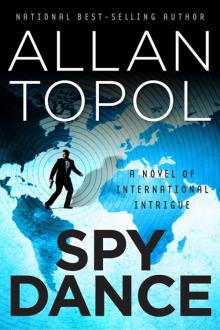 Spy Dance
Spy Dance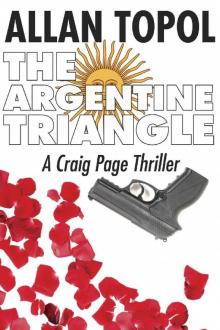 The Argentine Triangle: A Craig Page Thriller
The Argentine Triangle: A Craig Page Thriller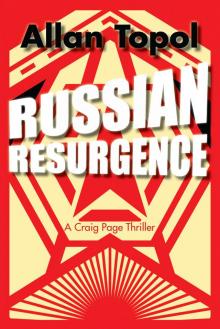 Russian Resurgence
Russian Resurgence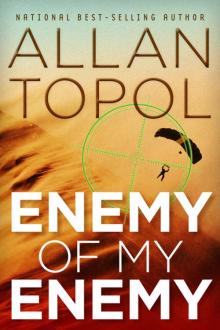 Enemy of My Enemy
Enemy of My Enemy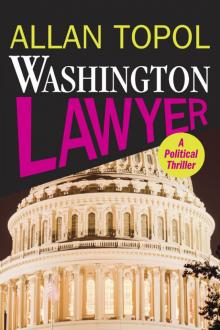 The Washington Lawyer
The Washington Lawyer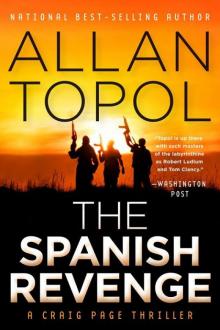 THE SPANISH REVENGE (Craig Page series)
THE SPANISH REVENGE (Craig Page series)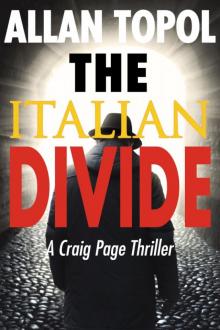 The Italian Divide
The Italian Divide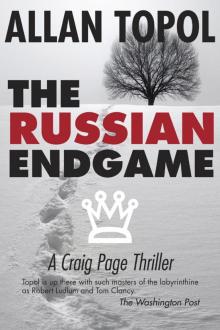 The Russian Endgame
The Russian Endgame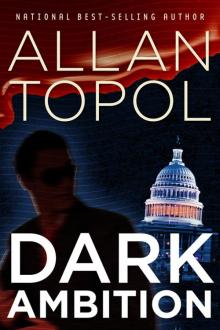 Dark Ambition
Dark Ambition